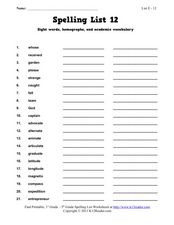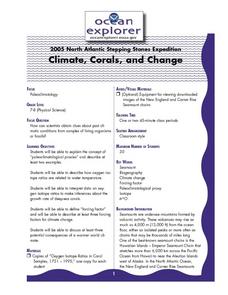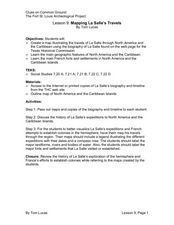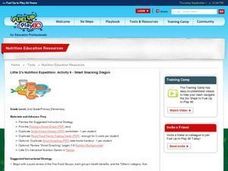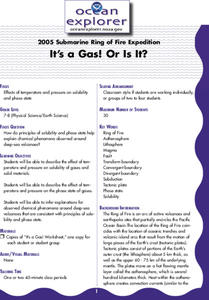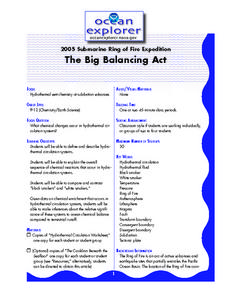Curated OER
South Pole Base Gamma
Students design a South Pole base. In this science lesson, students discuss characteristics of the South Pole and work in a group to design a base that will be named "Gamma." Students sketch their design.
Curated OER
Spelling List 12: Sight Words, Homographs, and Academic Vocabulary
In this spelling list worksheet, students practice spelling words that are sight words, homographs, and vocabulary. Students practice spelling 21 words total.
Curated OER
Mining and Land Reclamation - A Classroom Simulation
Students simulate mining mineral resources using cookies. In this earth science lesson, students analyze the cost and profits in mining. They write a lab report about the activity.
Curated OER
Breaking News English: New 3D Pictures of Titanic Released
In this ESL comprehension worksheet, students read or listen to a passage, complete warm-up activities, then a wide variety of before, during, after and homework activities. Answers are included.
Curated OER
Hawaiian Bowl!
Students describe the movement of tectonic plates in the Hawaiian archipelago region. They describe how a combination of hotspot activity and tectonic plate movement could produce the arrangement of seamounts obse
Curated OER
Climate, Corals, and Change
Students examine oxygen isotope ratios and how they are related to water temperature. They also identify three forcing factor changes for climate change.
Curated OER
Mapping La Salle's Travels
Students use the internet to create a map showing the path of La Salle through North America and the Caribbean. They identify the main geographic features of the two areas and the main French forts. They also complete a timeline.
Curated OER
Language Arts: Survival Diaries
Students are able to compose a dialectical journal entry which analyzes information presented in a text. They are able to compose a creative journal entry which develops characters, presents events in logical order, and includes sensory...
Curated OER
Pánfilo de Narváez, Nuñez de Cabeza de Vaca
Learners identify the route that Narváez and de Vaca sailed, and the mishaps that occurred during their exploration of Florida. They illustrate each of the vocabulary words or create mini barges using sticks and cloth.
Curated OER
Is There Sewage in My Sample?
Young scholars explore the proximity of the Hudson Shelf Valley and the Hudson Canyon to one of the Nation's most populated areas. They study that from 1987 to 1992, two dumpsites in the Hudson Shelf Valley and Hudson Canyon, one 12 miles
Curated OER
The Search for the Northwest Passage
Third graders listen to lectures and research the motivations and history of the Spanish, French and English explorers searching for the Northwest Passage to India. They trace routes on maps and consider how these explorers helped shaped...
Curated OER
Sir Milkford and Lady Holly's Milk Group
Second graders participate in teacher led activities that introduce the food groups and their importance to health.
Curated OER
King Henry's Meat Group
Second graders hear a story about King Henry the Egg, Little D and the meat group. They act out the parts as the story is read aloud and complete a worksheet. They pantomime activities that use and build muscle
Curated OER
We Need All Five!
Second graders review foods and their groups. They discuss the reasons why they need to eat from all five food groups. They try to write using only a few of their five fingers to see what happens when you don't use all five fingers.
Curated OER
Prince Waffle's Grain Group
Second graders participate in activities focusing on the grain group and food prices.
Curated OER
Smart Snacking Dragon
Second graders participate in activities that focus on making healthy snack choices.
Curated OER
Jelly Critters
Students compare and contrast three different organisms that are considered gelatinous zooplankton. They describe how they fit into marine food webs.
Curated OER
Three Cold Realms
Students identify organisms within the realms of pelagic, benthic and sea ice. They explain how these three interact with each other.
Curated OER
Where Have All the Glaciers Gone?
Students examine how climate change is affecting sea ice, vegetation and glaciers in the Arctic region.
Curated OER
Just Jelly
Students identify common gelatinous zooplankton in the Canada Basin and their ecological role. They compare and contrast feeding strategies of at least three different types of gelatinous zooplankton.
Curated OER
It's a Gas! Or is it?
Learners discover the principles of solubility and phase state and their influence on chemical phenomena observed around deep-sea volcanoes. They describe the effect of temperature and pressure on solubility of gasses and solid materials.
Curated OER
The Big Balancing Act
Students describe chemical changes occurring in hydrothermal circulation systems. They make inferences about the significance of these systems to ocean chemical balance compared to terrestrial runoff.
Curated OER
Cool Lights
Pupils investigate how and why deep-sea organisms produce light. They examine how these processes can be used to study deep ocean environments.
Curated OER
Where is That Light Coming From?
Learners investigate the chemistry of bioluminescence and discuss how various organisms benefit from this trait. They prepare a report about of at least one organism that receives each of the benefits discussed.
Other popular searches
- Lewis and Clark Expedition
- Expedition Routes
- Everest Expedition
- Harriman Expedition Journals
- Black Sea Expedition
- Lewis & Clark Expedition
- Expeditions North Pole
- Expeditionary Learning Unit
- Camel Expedition
- Expedition 7
- Custer Expedition
- Lewis and Clark's Expedition



